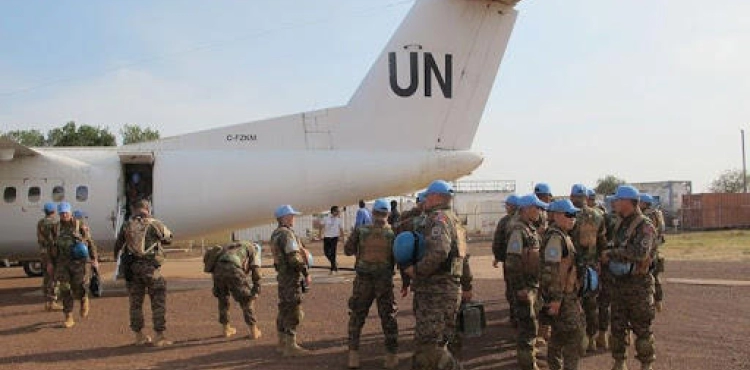The United Nations Mission in South Sudan (UNMIS) announced Friday that it had begun withdrawing its soldiers from multiple camps where tens of thousands of civilians had taken refuge during the civil war, seeking protection.
These camps were established in the capital, Juba, and other major cities after the outbreak of the war in 2013, where thousands of people fleeing the fighting, especially the brutal ethnic massacres that characterized this conflict, were sheltered at home.
Currently, more than 180,000 people still live in these camps, but the United Nations Mission in South Sudan said they are no longer under threat, six months after the two main rival leaders, President Salva Kiir and rebel leader Riek Machar, formed a unity government.
The UN Special Envoy for South Sudan, David Shearer, said during a press conference that the mission had begun a "gradual withdrawal" of its soldiers and police from camps in central Bor and northwest Wau.
"We did so because we estimated that the threats that were present a few years ago no longer exist today," he added.
The mission of these camps will be redefined as accommodation sites for the displaced and will be under the control of Juba instead of the United Nations.
The war broke out in 2013 after a disagreement between Kiir and Machar, and efforts to stop it did not succeed until a peace agreement was signed in September 2018, from which the current unity government emerged.
"No one will be expelled or asked to leave when UNMIS withdraws. Humanitarian services continue," Shearer said, explaining that the camps will no longer be under the control of the United Nations Mission in South Sudan, and the government must assume "responsibility."
"The police in southern Sudan will be responsible for law and order," he added.
The United Nations has 17 permanent bases for the peacekeeping mission in southern Sudan, with additional temporary bases during the dry season, in addition to about 14 thousand soldiers.
Shearer said that no less than 150 soldiers and a company or two police, each of about 150 members, will participate in protecting the camps.
He added that soldiers who had been serving in the camps could now be redeployed to hotspots where violence has escalated in recent months, such as East Jonglei.
The United Nations Mission in South Sudan said that about 600 people were killed in ethnic clashes between communities in the region in the past six months, which Shearer considered a threat to the peace process.
"UNMIS quickly deployed peacekeepers in the most affected areas to prevent the escalation of violence and support reconciliation and mediation between the conflicting groups," she added.
Meanwhile, the United Nations announced this week that it would establish a temporary base in Lobonoc in Central Equatoria State, after the National Salvation Front, which refused to sign the peace agreement, stepped up its attacks on civilians and aid workers.
Shearer noted that "the escalation of violence is extremely worrying and is leading to clashes" between government forces and the LTTE rebels.












